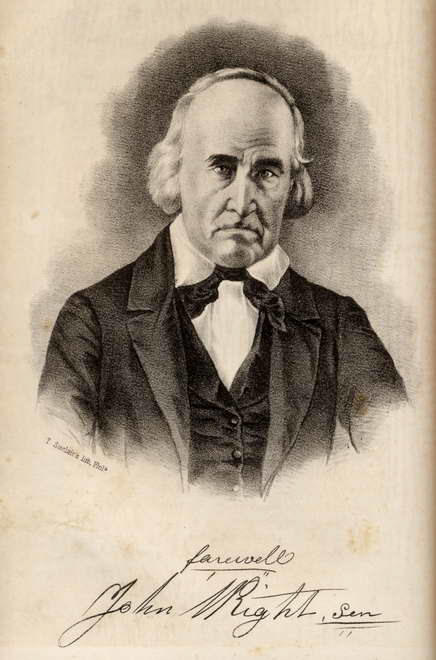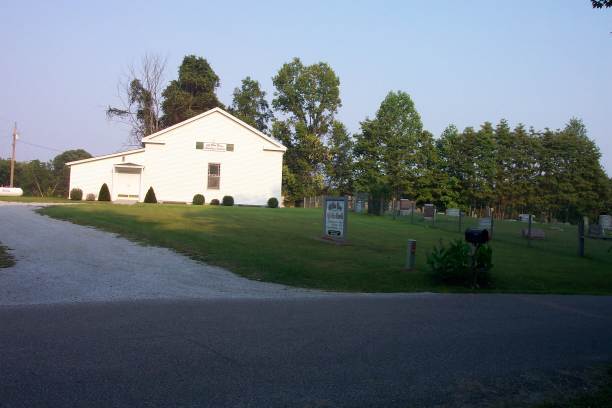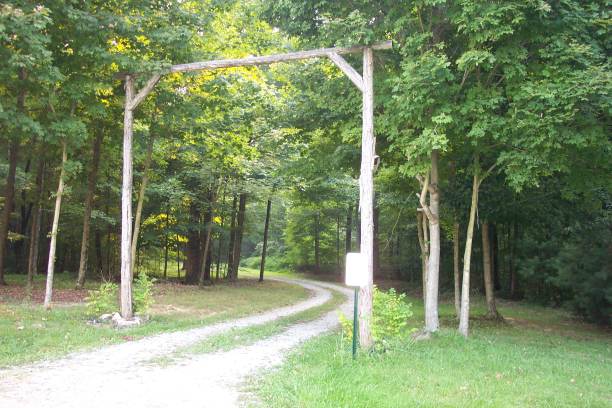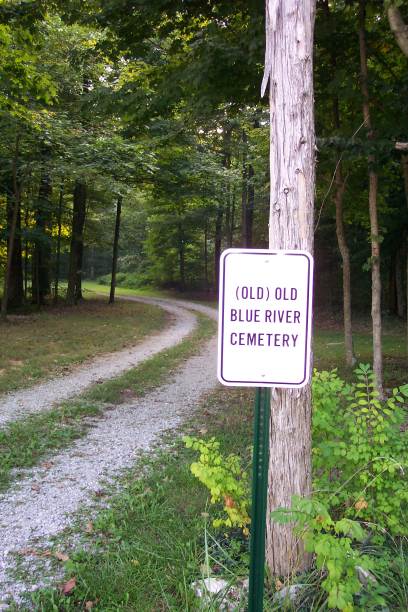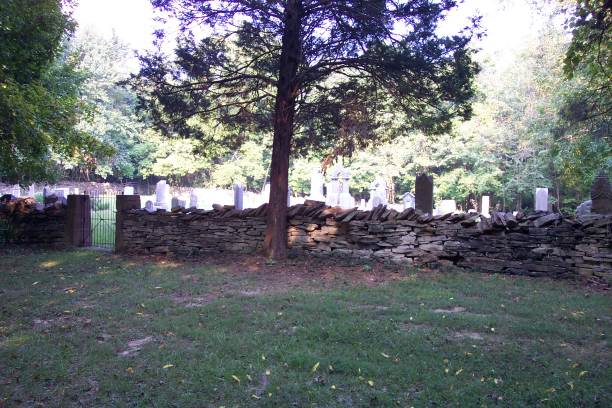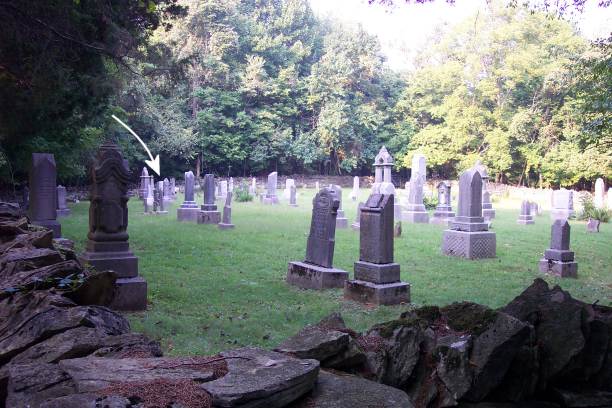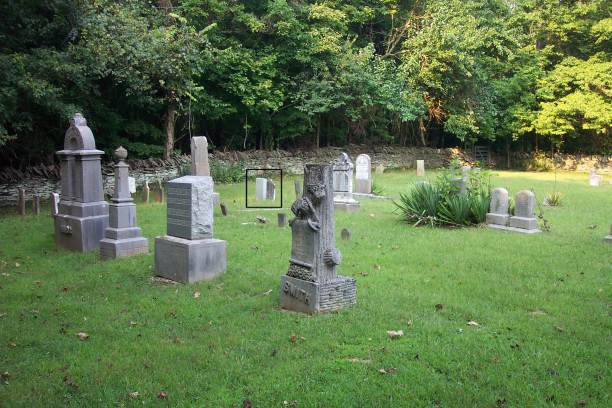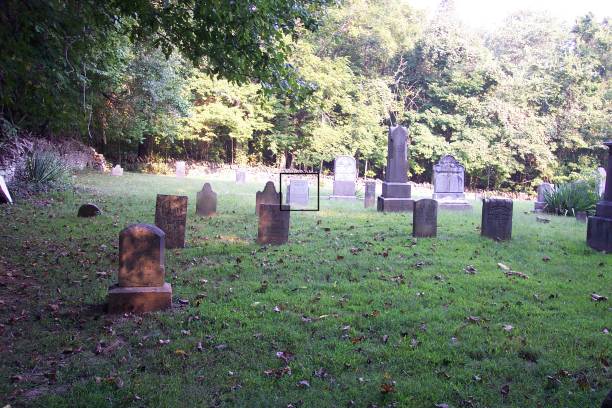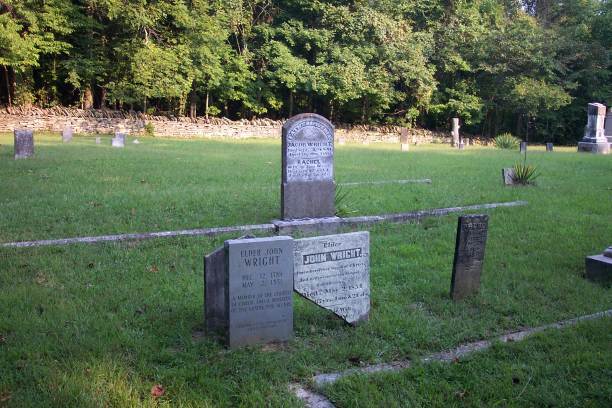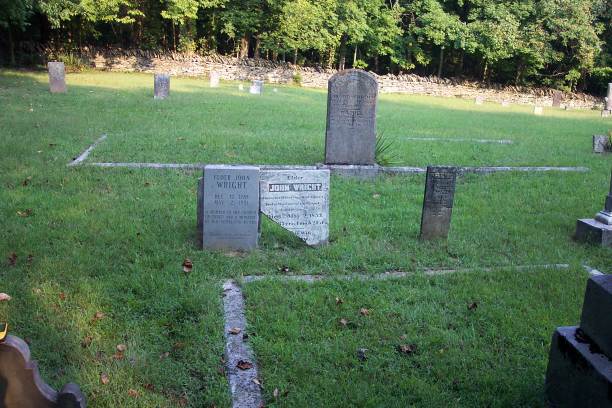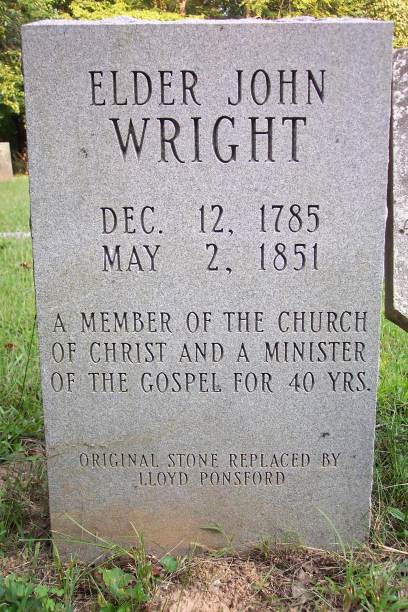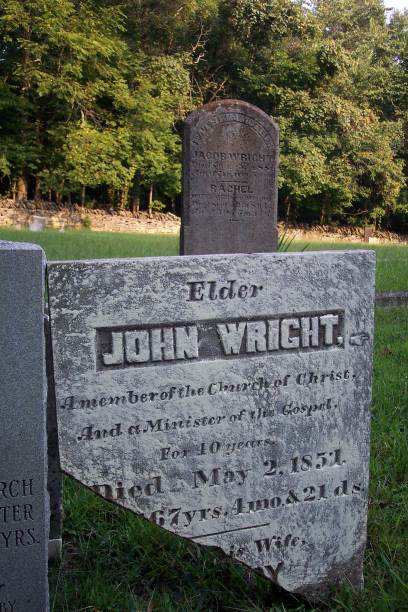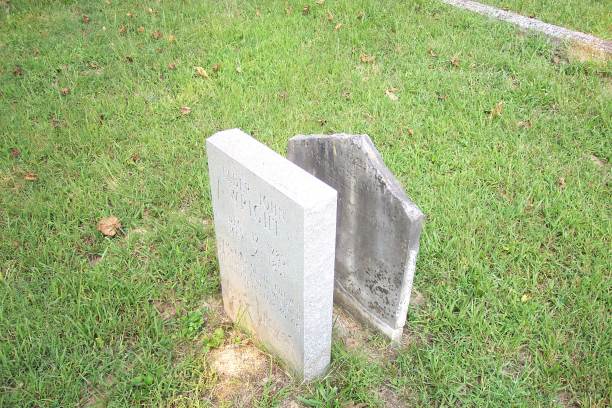John Wright
1785-1851
Biographical Sketch On The Life Of John Wright
Elder John Wright was born in Rowan county, North Carolina, December 12th, 1785. His mother was of German descent. His ancestors on his father's side came from England in very early times, and settled on the eastern shore of Maryland. From that place they were scattered abroad, some making their way to the Carolinas. His father was brought up among the Quakers or Friends; and, singularly enough, he turned away from that fraternity, who baptized none, to the Tunkers, who practiced trine immersion. He afterwards cast in his lot with the Dependent Baptists, among whom he became a preacher.
Elder Wright remained iu North Carolina until he was about twelve years of age. His father then removed with him to Powel's Valley, Virginia, where he grew up to manhood.
The most of his education he received from an old English gentleman by the name of Hodge, under whose tuition he acquired a good knowledge of reading, writing, and arithmetic. He received from the schools no further preparation for either the business of the world or the work of the ministry; but, having obtained the key to all knowledge, namely, reading, he constantly increased his stock of ideas by his own unassisted efforts. He was tolerably well informed upon general subjects, and could write a very respectable article, as may be seen by reference to the Christian Record, to which he was an occasional contributor.
From Virginia the whole family emigrated to the West and settled in Wayne county, Kentucky, where, on the 5th of January, 1803, Elder Wright was married to Miss Peggy Wolfescale. She accompanied him but a short distance on the journey of life, dying on the 12th of December, 1805, and leaving him with an infant daughter, which he entrusted to the parents of its departed mother.
After this bereavement, he engaged for two years in teaching school. At the expiration of this time he was again joined in marriage to Miss Nancy Peleer, who, for many years, proved a most excellent helpmate, ever ready, with him, to make any sacrifice for the cause of Christianity. She also died, on the 29th of August, 1844; and the following extract is from her obituary notice, written by T. C. Johnson, and published in the Christian Record for November of that year:
"She diligently followed every good work. The servants of God were often refreshed at her house by her hospitality. Saints always found her house their home; and sinners were so kindly treated by her as to endear her to them all. In short, she was an affectionate wife, a tender-hearted mother, an obliging and kind neighbor, and a mother in Israel, whose death is felt, not only by her afflicted relatives, but also by the Church and the community in which she lived."
Late in the year 1807, which was very soon after his second marriage, he removed from Kentucky to Clark's grant, Indiana Territory.
In August, 1808, he and his wife were immersed in the Ohio river, by William Summers, of Kentucky. He immediately united with the Baptist Church, and in the latter part of the same year he began to preach. Be it observed that this was fifty-four years ago, eight years previous to the admission of the Territory as a State, and long before the current Reformation was heard of by the inhabitants of the West. He must, therefore, have been among the very first to break the stillness of Indiana's forests with the glad tidings of salvation.
In January, 1810, he removed to Blue River, four miles south of Salem, in what was then Harrison, but now Washington county. There he entered a beautiful tract of land; and, by much hard labor, opened an excellent farm. In a short time his father moved into the same neighborhood; where, in 1810, they organized a congregation of Dependent or Free Will Baptists.
About this time they experienced serious trouble with the Indians; and, while the energies of the nation were directed against Great Britain, in the war of 1812, they were compelled to protect themselves by forts from the tomahawk and scalping-knife.
When peace and safety were restored, he entered again with increased zeal into the work of the ministry. He was assisted by his father, and a younger brother, Peter, who was beginning to preach with considerable success. The three Wrights exerted quite an influence in favor of Christianity, and it was not long until they had organized ten Baptist churches, which they formed into what was called the Blue River Association.
From the very first, John Wright was of the opinion that all human creeds are heretical and schismatical. He was perhaps the first man in Indiana that took his position on the Bible alone; and there has not come after him a more persistent contender for the word of God as the only sufficient guide in religious matters. He labored to destroy divisions, and promote union among all the children of God; and in this difficult yet most important service he made his indelible mark. Though at first he tolerated the term "Baptist", it being natural to condemn ourselves last, yet he afterwards waged a war of extermination against all party names. This war was declared in the year 1819, when he offered, in the church at Blue River, a resolution in favor of discarding their party name, and calling themselves by some name authorized in the Scriptures. As individuals, he was willing that they should be called "Friends," "Disciples," or "Christians;" and, as a body, "the Church of Christ," or "the Church of God." He opposed the term "Christian," as applied to the Church, because it is not so applied in the writings of the apostles.
The resolution was adopted with more unanimity than was expected; and the Baptist church has since been known as the Church of Christ at Blue River. Having agreed, also, to lay aside, as far as possible, their speculative opinions and contradictory theories, they presumed that they were prepared to plead consistently for Christian union, and to invite others to stand with them upon the one broad and sure foundation. They then began in earnest the work of reformation, and with such success that by the year 1821 there was scarcely a Baptist church in all that region. They all took upon them "that worthy name," and converted their Association into an Annual Meeting.
About this time a spirited controversy on the subject of Trine Immersion, was going on among the Tunkers, of whom there were some fifteen congregations in that section of the country. The leading spirits in opposition to that doctrine were Abram Kern of Indiana, and Peter Hon of Kentucky. At first they contended against great odds, but so many of their opponents came over to their side that they finally gained a decisive victory in favor of one immersion.
At the close of the contest, while both parties were exhausted by the war, Elder Wright recommended to the Annual Meeting that they should send a letter to the Annual Conference of the Tunkers, proposing a union of the two bodies on the Bible alone. The letter was written, and John Wright, his brother Peter, and several others, were appointed as messengers to convey it to the Conference and there advocate the measures it proposed. So successful was the expedition that at the first meeting the union was permanently formed, the Tunkers being persuaded to call themselves Christians.
At the same annual meeting Elder Wright proposed a correspondence with the Newlights, for the purpose of forming with them a more perfect union he was appointed to conduct the correspondence on the part of his brethren, which he did with so much ability and discretion, that a joint convention was assembled near Edinburg, where the union was readily formed. Only one church in all the vicinity refused to enter into the coalition, and it soon died of chronic sectarianism.
A few years subsequent to this, the work of Reformation began to progress rapidly among the Regular Baptists of the Silver Creek Association. This was, remotely, through the influence of Alexander Campbell, but directly through that of Absalom and J. T. Littell, and Mordecai Cole, the leading spirits in that locality. Through their teaching hundreds of individuals and sometimes whole churches were renouncing all human creeds and coming out on the Bible alone; yet a shyness existed between them and those who had previously done the same thing under the labors of John Wright. The former, having held Calvinistic opinions, stood aloof through fear of being called Arians; while the latter feared to make any advances lest they should be stigmatized as Campbellites. Thus the-two parties stood, when Elder Wright, braving the danger of being denounced as a Campbellite, established a connection between them by which the sentiments of each were communicated to the other. By this means it was soon ascertained that they were all endeavoring to preach and practice the same things. The only important difference between them was in regard to the design of Baptism, and on this point Elder Wright yielded as soon as he was convinced of his error. Through the influence of himself, his brother Peter, Abram Kern, and others, on the part of what was called the Annual Meeting of the Southern District, which was composed of those who had been Baptists, Tunkers and Newlights; and through the efforts of Mordecai Cole and the Littells, on the part of the Silver Creek Association, a permanent union was formed between those two large and influential bodies of believers. In consequence of this glorious movement, more than three thousand struck hands in one day,not in person, but through their legal representatives, all agreeing to stand together on the one foundation and to forget all minor differences in their devotion to the great interests of the Redeemer's kingdom. This was, perhaps, the greatest achievement of Elder Wright's long and eventful life; and he deserves to be held in everlasting remembrance for his love of truth rather than of party, for his moral courage in carrying out his convictions of right, and for the meek and affectionate spirit which gave him such power in uniting opposing sects and cementing them in love.
To the happy effects of this obliteration of party lines he testified a few years afterward. In a communication to the October number of the Christian Record for 1845, he wrote as follows:
"Beloved brethren in the Lord: Through the permission of our kind heavenly Father I have travelled through many of the churches in the south part of the State, and have been abundantly comforted in the society of our good brethren in Christ. For many years we have seen many who, like the Jews and Samaritans, had no religious dealings: but when the gospel was preached by Peter to the Jews according to his broad commission, about three thousand joyfully received and obeyed the truth. And when Philip, the evangelist, preached to the Samaritans, they 'believed and were baptized both men and women.' And when the same gospel was preached to the Gentiles by Peter, they also believed and obeyed from the heart the same divine form of doctrine. Thus we see believers from all the sectarian parties of that age united in one body in Christ: having laid aside their former prejudices and hatred, together they put on Christ according to the constitution of his kingdom; there was no longer Jew, Gentile, or Samaritan as formerly, but they were now all partakers of the divine nature, were all made to drink into one spirit, in short they all became children of God - Christians."
"So it was in Southern Indiana: formerly we had Regular Baptists, separate Baptists, German or Dunkard Baptists, free will Baptists, Christian connexion, or Newlights. These societies in some respects were like the Jews and Samaritans of old; but the old gospel was preached among these warring sects with great power and success. Much of the partyism that existed was removed, and most of their party names were done away. * * * Formerly we all had in our respective churches much that was purely human; but now, in the church of God, we have no need of the 'mourning bench,' 'the anxious seat,' or any other institution of man's device; but in the church is the place where the solemn feast of the Lord's body is celebrated, and sincere worship is offered to the Father in spirit and in truth."
It was not with the pen but with the tongue that his influence was chiefly exerted. The preceding extract is, perhaps, a fair specimen of his composition. The style, the capitals, and the punctuation, indicate that it is a genuine production of the unlettered pioneer.
At first it was prophesied that such a union could not continue. This prediction grew out of the fact that the materials had been collected from many different denominations: Baptists, Newlights, Tunkers, Methodists and Presbyterians. But a quarter of a century has passed away, and the prophecy is not yet fulfilled. On the contrary, those who were young when the union was formed, have, in their old age, almost forgotten that they ever were divided.
Alas for the interests of Christ's kingdom, that race of prophets is not yet extinct! There are still those who tell us that "men cannot all think alike, or belong to one Church;" and who give thanks to God that there is a variety of Churches, so that all may be accommodated. If, in the consequent confusion, thousands of our fellows should stumble over us into skepticism, and finally into destruction and perdition, it is no matter, if only we can all be "accommodated!" If Christ died for all, as the apostle affirms, then all can belong to one Church; otherwise he would have built two or more. The Lord, by the pen of his apostle, commands "all that in every place call upon the name of Jesus Christ," to "all speak the same thing, and to have no divisions among them." By this and every other positive commandment stands the Reformation, firm as the lone Elijah by the worship of the living God. As it fearlessly advances, sectarianism confronts it, saying, in the language of the wicked Ahab, "Art thou he that troubleth Israel?" It answers, in the bold words of Elijah, "I have not troubled Israel, but thou and thy father's house, in that ye have departed from the commandments of the Lord." All the day long, as did those of old, these latter-day prophets have called upon God to convert the world in their way, but he has been deaf to all their cries. Now, therefore, in the evening, the advocates of reform desire to call upon him according to his will, confident, as was Elijah, that he will hear their cry and accept their sacrifice.
Besides his efforts to effect a union of all God's people, Elder Wright did much, in his lifetime, for the cause of the Redeemer. By means of his farm in Washington county he was able, without much labor, to make a comfortable living; and, as he sought to lay up no treasure on earth, he devoted the greater part of his time to the work of the ministry. Through lack of records it is impossible to follow him from year to year, giving a detailed account of his labors and successes in the gospel. Suffice it to say, that for more than forty years he preached much, and with good results, in Washington and several other counties of southeastern Indiana. The people had unbounded confidence in his piety and judgment, and wherever he went they were to a great extent under his influence.
On the death of his second wife, in 1844, he sold his farm to his son Ransom, reserving one room of the house for his occasional use during the remnant of his days. Afterwards he spent nearly all his time among the brethren, comforting, establishing, strengthening them.
In addition to his labors, he also sacrificed much for the support of the gospel. In the good providence of God, his father, step-mother, all of his brothers, sisters, and children were zealous members of the Church of Christ. His father and his four brothers, Peter, Levi, Joshua, and Amos, were all preachers of the "repentance and remission of sins" that began at Jerusalem. His youngest son died on the 19th of November, 1843; and Christianity had made bright his pathway to the tomb. He therefore felt that he could never give too much in support of that gospel which had given so much peace, and joy, and hope to his family. Often did he borrow money to defray his expenses to his appointments; and sometimes, through the illiberality of the brethren, he was compelled to resort to the same expedient in order to get home. He used to purchase wine at high rates, and carry it forty or fifty miles in his saddle-bags, in order that he might show forth the Lord's death with his brethren.
During the first years of his ministry, he never so much as expected any remuneration for his services; for it was a prominent article in the unwritten Baptist creed that the preacher should do nothing for filthy lucre. By this doctrine the generosity of the brethren was so stifled that it has not yet recovered the healthy action it possessed in apostolic times. Money was never the object for which he toiled; but he thankfully received, with an enlightened conscience, whatever was offered, believing that, as he loved to contribute, every other brother, who had the cause near his heart, should enjoy the same privilege. As heart and flesh failed him, the liberality of the churches increased; and, after his family had all begun life for themselves, or passed away to the spirit land, he received for his preaching what was amply sufficient to supply all his earthly wants.
He enjoyed excellent health until very near the close of his pilgrimage; and it was a saying with him that he "never had a pain as long as his little finger." But, though he lived many years, and rejoiced in them all, the days of darkness were in reservation for him. In the spring of 1850 he was seized with acute inflammation of the stomach. The disease readily yielded to medical treatment, and in a short time he resumed the Master's work. In the fall of the same year it returned upon him in a more violent and obstinate form, and he expressed the conviction that his race was almost run.
He passed the winter with his son Jacob, at Salem, and by the coming of spring he had so far recovered as to be able to return home to his son Kamsou's. Immediately afterwards he grew worse, and began to sink rapidly. His brother in the gospel, Dr. H. T. N. Benedict, was called in; but he could do no more than to com- ort him in his afflictions by pointing him to his eternal weight of glory.
His living children were all near him except his son Jacob, who was preaching at New Albany. He was summoned; and when he came his father said, "My son, I am just waiting for my discharge." He seemed more like one preparing to start on a long journey than one about to experience the agony of death. He first spoke to his family relative to some pecuniary matters. These being disposed of to his satisfaction, he requested Dr. Benedict to write his obituary notice, and also expressed his desire that J. M. Mathes should preach his "Christian farewell," from Rev. xiv. 13. He observed that he had lived in Washington county over forty years; that if he had in it an enemy he did not know it; and that he thought he could make one more successful appeal to the citizens, through "little Jimmy," as he called Elder Mathes. In a few moments he said to J. L. Martin, "Brother Lena, you will see to making my little house", meaning his coffin. He then remarked that he believed he was ready to go, that he did not think of any thing else. Presently he said to his son Jacob: "There is one thing I had forgotten. Abram Kern and I were appointed as messengers to write and convey a letter to the Annual Meeting of Silver Creek District. I want you to write the letter, and go with Brother Kern to introduce him, for he will be a stranger there."
As he approached his dissolution, he conversed more and more, exhorted those present to be faithful, and repeated several passages of Scripture, among them the fifth of Corinthians, commencing, "For we know that if our earthly house of this tabernacle were dissolved we have a building of God, a house not made with hands, eternal in the heavens." After taking his final leave of his family and friends, he placed his hands across his breast, closed his own eyes, and breathed softly and still more softly until he fell into his last long sleep, without the movement of a muscle, his lips remaining compressed, his eyes closed, and his hands just as he had placed them. Thus passed away from earth Elder John Wright, at eight o'clock in the evening of May 2d, 1851, aged 67 years, 6 months, and 26 days."
"Had the skeptic," says an eye-witness, "been privileged to behold the triumphant exit of this man of God, his skepticism would have been blown away by the dying breath of this aged, this devoted servant of our Divine Redeemer."
____________________
Elder Wright was a tall, square-built man, of excellent constitution and great physical power. Many were the giant oaks that he felled to earth by the sturdy strokes of his axe.
His mental powers were as good by nature as his physical: the disparity in their development was a necessity of the times in which he lived. He possessed an iron will, tempered even to flexibility by the spirit that was in Christ.
His character was a most happy combination of "whatsoever things are true, whatsoever things are honest, whatsoever things are just, whatsoever things are pure, whatsoever things are lovely, whatsoever things are of good report." He was an uncompromising advocate, a bold and fearless defender of the truth; yet he usually employed the "soft answer" that turns away wrath, rather than the "grievous words" which stir up strife.
As a speaker he was unpolished, not logical, but very sympathetic. His own heart being full of love and fealty to God, he induced the same feeling in the hearts of those who heard him; for, "as in water face answereth to face, so the heart of man to man." Uneducated and untaught in the art of speaking, his useful career is a demonstration of the power of a holy life. May his brilliant success in the gospel stimulate all evangelists, of this more enlightened age, to combine with their intellectual acumen the godliness of this departed pioneer.
-Biographical Sketches of Pioneer Preachers Of Indiana, Madison Evans, Page 29-41.
![]()
JOHN WRIGHT OF INDIANA
A GREAT LEADER LEFT IN OBSCURITY
All who are acquainted with restoration history, remember the illustrious names of Thomas and Alexander Campbell of Virginia, Walter Scott of Pennsylvania, Barton W. Stone and "Raccoon" John Smith of Kentucky. Although John Wright was an early and ardent advocate of restoration principles, his name is conspicuously absent From most publications on the Restoration Movement. Consequently, his name and great work are to an extent left in obscurity.
ANCESTORS
John Wright was the son of Amos, Sr. and Elizabeth (Low) Wright. He was born December 12, 1783 (one record gives 1785) in Rowan County, North Carolina. His mother was of German descent, but the older Wrights were immigrants from England. Amos Wright, Sr. was born in Rowan County, North Carolina, in 1764 and departed this life October 14, 1846, in Washington County, Indiana. He fist married Elizabeth Low in North Carolina, who died in Wayne County, Kentucky, at the age of 41 years. He later married Margaret Davis, who died in 1842. She and Amos are buried in Old Mill Creek Cemetery, Washington County, Indiana.
Amos Wright, Sr., was reared among the Quakers, but later became a "Tunker." He soon moved into the Baptist fellowship and began to preach among the Dependent or Free Will Baptists. Later it was his privilege and pleasure to join with his son, John, and his associates in the plea to discard all human creeds and sectarian names and to take the "Bible alone" as authority in religious matters.
MIGRATION
The Wright family migrated from North Carolina into Powell's Valley, VA., where they resided for a few years. Then they moved to Wayne County, Ky. In the late fall of 1807 they moved to Clark's Grant, in Indiana Territory. This was about nine years before the Territory was established as a state. While in Wayne County, Ky., John was joined in marriage to Miss Peggy Wolfscale on January 5, 1803. Their sacred journey together was shortened by her death in 1805. His beloved Peggy left him an infant daughter, which was entrusted to Peggy's parents. After this bereavement, he found himself busily engaged in teaching school for two years. His second marriage was to Miss Nancy Peleer, who for many years proved to be his faithful companion, sharing together with her husband the love and joy as well as the sorrows and sacrifices that led to the great success of this pioneer preacher. The proverb, "Back of every successful man is a woman," certainly was true of John and Nancy Wright.
EDUCATION
John Wright was a tall "square-built man" of' sturdy constitution and enormous physical strength. With a robust physique and brilliant mind and strong will, with faith in God, he was ready for a rugged yet successful life and work on the western frontier. He was a typical farmer and woodsman. He frequently used his ax with powerful strokes to topple the giant oaks of the time. He was an uneducated man by scholastic standards. Wright had a thirst for true knowledge and he took advantage of private teaching from an old English gentleman by the name of Hodge. From this Englishman he obtained a good working knowledge of reading, writing, and arithmetic. Beyond this, he was a self-educated man.
His greatest desire was to read, study, and obtain knowledge of the Bible that he might successfully teach it to others. Few men have equaled his success with such limited education, and perhaps none have surpassed him under similar circumstances. William Lyon Phelps, a noted educator once said, "I thoroughly believe in a university education for both men and women; but I believe a knowledge of the Bible without a college education is more valuable than a college course without the Bible."
A LONG AND SUCCESSFUL MINISTRY
Near the close of he year 1807, John with his wife Nancy, had left Kentucky with other members of his family, moving to Clark's Grant, Indiana Territory. John and his wife were immersed in the Ohio River in August 1808 by William Summers of Kentucky. Some time in 1909 he settled with members of his family near Blue River, approximately four miles south of Salem, Indiana. He had already started his preaching during the same year in which he was immersed having immediately united with a Baptist congregation. In 1810 at Blue River he and other members of his family organized a congregation of Dependent Baptists, or Free Will Baptists. He began with his father to preach in the surrounding areas with some success. However, their work was interrupted for a while as a result of the War of 1812. During this time the Wrights lived in old Fort Hill that the settlers had built to protect themselves against the Indians, who were then anxious to use their deadly skill with tomahawk and scalping knife on the "pale face" settlers. After the war had ended, John increased his work in the ministry with fervent zeal and renewed hope. He was assisted by his father and a younger brother, Peter, who had just begun to preach with considerable success. These three men exerted influence in favor of a return to the "Bible alone" in religious matters.
DECLARED WAR ON ALL PARTY NAMES
We here insert a quotation from Pioneer Preacher: John Wright "from the very first was of the opinion that all human creeds are heretical and schismatical. He was perhaps the first man in Indiana that took his position on the Bible alone. And there has not come after him a more persistent contender for the Word of God as the only sufficient guide in religious matters. He labored to destroy divisions and to promote union among all the children of God. And in this difficult, yet most important service, he has made his indelible mark." He at first tolerated the name Baptist, but later "waged war of extermination against all party names." As a result of his opposition to all party names, he prepared a resolution in 1819 which favored the discarding their party name, Baptist. The resolution was adopted and the congregation dropped the term Baptist, and was from thenceforth known as the Church of Christ at Blue River. He insisted that they be called as individuals, Friends, Disciples or Christians, and as a body it should be called the Church of Christ or the Church of God. He opposed calling the congregation, Christian Church, for it was not so applied in the apostles' writing. Wright persuaded most of the members of ten congregations to abandon the name Baptist and to change the Baptist Association on Blue River to an Annual Meeting. By 1821 there was hardly a Baptist Church in all the region.
HIS PLEA AMONG THE TUNKERS
About this time a heated controversy among the Tunkers was raging. They were German Baptists and were called Tunkers. being derived from the German word tunken, meaning to dip or immerse. Abram Kern of Indiana and Peter Hon of Kentucky were the principle contenders opposing triune immersion. At the beginning "they contended against great odds," but finally many were persuaded in favor of one immersion. Wright then proceeded to bring the Tunkers into a more complete union with his brethren. His proposal was presented to his brethren at an Annual Meeting. All present encouraged John and Peter, his brother, to go among the Tunkers at their next Annual Conference, and at that first meeting, found them receptive to his proposal. They laid aside their opinions and agreed to stand as one with Wright's brethren and to be called Christians.
MEETING WITH NEW LIGHTS
At the same Annual Meeting he had also proposed a correspondence with the New Lights. Other religious bodies had been previously called by this name. These immersionists were called by that name, having been either directly or indirectly influenced by the teaching of Barton W. Stone of Kentucky. They were sometimes called Christian Connection. After Wright had completed the correspondence on the part of his brethren, a joint conference was conducted at Edinburg. During this meeting union was readily formed. Only one congregation in all the vicinity refused to join in the movement. That congregation is said to have soon died of chronic sectarianism.
EFFORTS AND SUCCESS AMONG REGULAR RATPISTS
A few years subsequent to the Wright movement, the work of "Reformation" had begun among the Regular Baptists, which had been formed into the Silver Creek Association. Alexander Campbell had indirectly influenced the "Reformation" in that area. Wright, who had previously brought a large number together on the plea for the Bible alone, turned his attention to the current movement being led by the Littells and Cole among the Regular Baptists. It was through the leadership of John Wright, his brother Peter, and others from the Annual Meeting of the Southern District, joined by Mordecai Cole and the Littells on behalf of the Silver Creek Association, that "a permanent union was formed" between the two groups, consisting of three thousand souls.
JOHN WRIGHT'S LAST YEARS, 1844- 1851
As a result of his wife's death on August 29, 1844, his spirit was "cast down but not destroyed." He sold his firm to his son Ransom, and reserved one room for occasional use during his remaining earthly pilgrimage. The next day after his beloved Nancy's body had been lowered into the grave, he arose with courage and strength to attend an Annual Meeting with the Church of Christ in Driftwood, Jackson County. Although he received encouragement and some comfort from his brethren, he returned home from that meeting with a heart of heaviness. He wrote in his diary, "Oh how lonesome I feel . . . no tender companion to console me between the grave and heaven." Wright had seen hundreds of people up to this time moved by his earnest plea to take a stand upon the Bible only After the death of his devoted wife Nancy, even while suffering the greatest of bereavement. he was determined to preach as he had previously done for more than thirty years. His faithful father and four of his brothers were engaged in preaching the word also. These brethren were Joshua, Levi. Peter and Amos, Jr. They pleaded "for the union of all professions upon the Bible alone . . . but were hostile to all innovations, such as organs. melodeons introduced into the worship of God." They believe that these innovations with "anything that the Holy Spirit has not revealed. . . is nothing more or less than will worship," and therefore "sinful." The Wrights "went everywhere preaching the work." There were many churches of Christ by this time. From information in his diary we learned that he travelled and preached "among these churches." He travelled to many places on horseback, the common mode of transportation in those days. His journeys took him north of Columbus, Edinburg, Indianapolis and Lebanon, the county scat of Boone County; also northeast as far as the city of Fat Wayne, as well as to the mid-western part of the state. On one of his journeys he recorded having travelled as far west as Danville, Illinois. He once made a long and rugged journey into Kentucky going south to Elizabethtown in Hardin County and neighboring areas, then southward to Glasgow in Barren County, visiting congregations of that area. One meeting was with "the church called Berea near Big Barren River, three baptized and added to the church there." When he returned home to Indiana, his work among the churches did not subside. Many had sprung up from the seed of the kingdom having been sown on productive soil. He continued to comfort the weak and discouraged, as he had realized his need for comfort. Wright also continued in his last years to establish new congregations. He and his brethren were evangelistic in spirit, having never been enslaved by the doctrine of Calvinism. His father, Amos, Sr., had been with him in his work from the beginning. Later, Peter. Joshua, Levi, and Amos, Jr., joined with him in the work. They "all . . . were preachers of the 'repentance and remission of sins' that began at Jerusalem." All of his children were zealous members of the church of Christ. Random quotes from his diary show some of the results of his work in his meetings at various places. "One came forward and made the noble confession and was immersed." "Baptized one and reclaimed one." "Four confessed and put on Christ by baptism."
As monthly periodical was being published at this time, called the Christian Record. In the October issue of 1845 appeared the following from John Wright: "Beloved brethren in the Lord: Through the permission of our kind heavenly Father I have travelled through many of the churches in the south part of the State, and have been abundantly comforted in the society of our good brethren in Christ. For many years we have seen many who, like the Jews and Samaritans, had no religious dealings: but when the gospel was preached by Peter to the Jews according to his broad commission, about three thousand joyfully received and obeyed the truth. And when Philip. the evangelist, preached lo the Samaritans, they 'believed and were baptized both men and women.' And when the same gospel was preached to the Gentiles by Peter, they also believed and obeyed from the heart the same divine form of doctrine Thus we see believers from all the sectarian parties of that age united in one body in Christ: having laid aside their former prejudices and hatred, together they put on Christ according to the constitution of his kingdom; there was no longer Jew, Gentile, or Samaritan as formerly, but they were now all made to drink into one spirit, in short they all became children of God - Christians.
"So it was in Southern Indiana: formerly we had Regular Baptists. separate Baptists, German or Dunkard Baptists, Free will Baptists, Christian Connexion or Newlights. These societies in some respects were like the Jews and Samaritans of old; but the old gospel was preached among these warring sects with great power and success. Much of the partyism that existed was removed, and most of their party names were done away. Formerly we all had in our respective churches much that was purely human; but now, in the church of God, we have no need of the 'mourning bench,' and 'anxious seat,' or any other institution of man's device; but in the church is the place where the solemn feast of the Lord's body is celebrated, and sincere worship is offered to the Father in spirit and in truth."
CONCLUSION
Wright continued his faithful active preaching to near the end of his earthly pilgrimage. He died May 2, 1851, at the home of his son. Ransom, in Washington County and his body was buried in the Old Blue River Cemetery, where his second wife, Nancy. had been entombed since 1844. Needless to say, when the United Missionary Society was organized among the churches in Cincinnati, Ohio, in 1849 and the mechanical music was introduced at Midway, Ky., in 1859. these innovations soon were accepted by many Indiana congregations. But some of the original congregations still remain faithful in southern Indiana to this day. These older congregations, along with new ones. continue to follow the New Testament principles and practices authorized by biblical authority on the work and worship of the church.
BIBLIOGRAPHY
John Wright, Sr. Pioneer Preachers, by Madison Evans, 1862
Old Manuscript on the Wright family, Collected by Lulie Davis, May 1966
Copy of old diary by John Wright, 1844-1850
Early Preachers-John Wright, "defender of the truth'' by Helen Burgess, February
1972
-F-HU Lectures, 1987, pages (83-89), JOSEPH H. COX (BIO): Joseph Cox grew up in an area and in an age when formal schooling was not so readily available as it is today. He remembers attending "Bible readings" which were conducted by the Traders' Point Church of Christ. During the winter of 1932-33, he attended this school daily the entire New Testament was read and thoroughly studied from Matthew to the "Amen" of Revelation. He preached his first sermon in 1933 and has preached the gospel ever since. For short periods brother Cox attended Freed-Hardeman College. Brother Cox has expressed deep appreciation for the instruction he received as a student at F-HC. He married Wanda McKinney and they have been married for more than fifty years. The Coxes have three sons: Vernon Jackson. Merrill Richard. and Foy Wallace. Brother and sister Cox are strong supporters of Freed-Hardeman College.
![]()
Directions To The Grave Of John Wright
John Wright is buried in the old Blue River Christian Cemetery south of Salem, Indiana - NOT THE CEMETERY NEXT TO THE CHURCH.
From Louisville, Kentucky: Head north on I-65 to Exit 19, Hwy. 160 and turn left (west). Head toward Salem. Hwy 160 will dead into Hwy. 60 (Jackson St.) Turn right on Jackson St. Turn left on S. Main St. (Hwy. 135) and head south of town. About five miles south of town turn left on E. Rudder Rd. Go .6 miles and turn right on S. Blue River Church Road. Go 1.1 miles and the church and NEW cemetery is on the left. NOTE: Wright is NOT buried here. Across the street from the church building is a little road heading into the woods. Follow the road to a gate. Open the gate and go through. Head down the old road to a barn on your left. Then bear to the right and head down a steep hill and back up on the other side. When you get to the cemetery you will be about 1/2 mile from the road. This is the old cemetery where the Wrights are buried. Go through the gate and head to the far left side of the cemetery to find the burial plots of the Wright family.
From Indianapolis: Head south on I-65 to Exit 29b (Hwy. 56) in Scottsburg. Head west toward Salem. Travel on Hwy. 56 into Salem. Turn left on N. Main St. Head through downtown and continue south on S. Main St. out of town. About five miles south of town turn left on E. Rudder Rd. Go .6 miles and turn right on S. Blue River Church Road. Go 1.1 miles and the church and NEW cemetery is on the left. NOTE: Wright is NOT buried here. Across the street from the church building is a little road heading into the woods. Follow the road to a gate. Open the gate and go through. Head down the old road to a barn on your left. Then bear to the right and head down a steep hill and back up on the other side. When you get to the cemetery you will be about 1/2 mile from the road. This is the old cemetery where the Wrights are buried. Go through the gate and head to the far left side of the cemetery to find the burial plots of the Wright family.
GPS Coordinates
38°32'54.2"N 86°05'02.7"W
or D.d. 38.548375,-86.084069
Elder John
WRIGHT
Dec. 12, 1785
May 2, 1851
A Member of the Church
of Christ And A Minister
Of The Gospel For 40 Yrs.
Original Stone Replaced By
Lloyd Ponsford
Elder
John Wright
A member of the Church of Christ.
And a Minister Of the Gospel
For 40 years.
Died May 2, 1851
Aged 67 yrs. 4 mo. & 21 ds.
His Wife
Nancy
Died 29th of August, 1844
![]()
